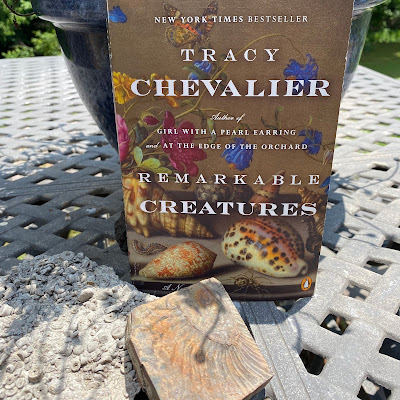Fossils are a huge attraction for me, so Tracy Chevalier's Remarkable Creatures was a given for me to read. I even photographed the book with an ammonite impression my friend and I discovered in Colorado, and a conglomerate of crinoids I found on a lakeside.
I was so excited to read about these two historical women, Mary Anning and Elizabeth Philpot, who pioneered the science and discovery of fossils. The novel did not disappoint. It's a quiet story without the huge dramatic dramas we expect from fiction. The tension is mostly internal as these two women take up scientific pursuits in the early 1800s when science was exclusively male. Both spinsters, they also struggle internally with feelings of self-value and significance and must unearth their own inner strength.
The historical aspect is so convincing that I forget I'm not stepping into this time as my current reality. Chevalier is clearly at home with the historical genre b/c the narrative feels so authentic and natural without being heavy-handed with factoids and explanations of antiquated practices in an attempt to make it feel authentic while achieving the opposite. I have a lot to learn from this author.
What's tragic to me is that, except for the few people in the field and certainly the people of Lyme Regis where Philpot and Anning lived, the huge contribution these two women made in the development of paleontology is still largely unsung. Their names were successfully buried from most of us by the male-ruled scientific community. This novel manages to bring them out of the shadows and display for the world the beauty and the legacy these women left behind.
For that alone, Remarkable Creatures is worth reading. Then, on top of that, we get the gorgeous prose and wise insights we love in well-told fiction. So it's a double win.










